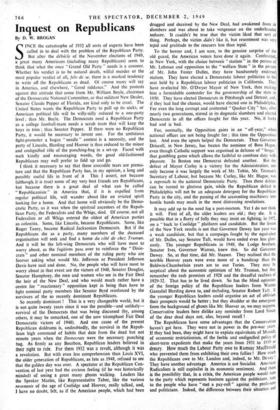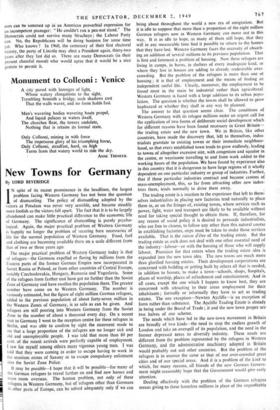Inquest on Republicans
By D. W. BROGAN
SINCE the catastrophe of 1932 all sorts of experts have been called in to deal with the problem of the Republican Party. But after the debacle of the November elections of 1949, a great many Americans (including many Republicans) seem to think that what the once " Grand Old Party " needs is a coroner.
Whether his verdict is to be natural death, wilful murder or the most popular verdict of all, fel° de se. there is a marked tendency to write off the Republicans as dead. Of course many will say in America, and elsewhere, " Good riddance." And the protests against this attitude that come from Mr. William Boyle, chairman of the Democratic National Committee, or that militant New Dealer, Senator Claude Pepper of Florida, are kind only to be cruel. The United States wants the Republican Party to pull up its socks, or American political life will be willy-nilly reduced to a one-party level ; thus M r. Boyle. The Democrats need a Republican Party as a college football-team needs a scrub team that will keep the boys in trim ; thus Senator Pepper. If there were no Republican Party, it would be necessary to invent one. For the ambitious fight-promoter a bogus " needle " contest is a necessity, and the party of Lincoln, Harding and Hoover is thus reduced to the minor and undignified role of the punching-bag in a set-up. Faced with such kindly and encouraging words, the good old-fashioned Republicans may well prefer to fold up and go.
I think it necessary to say that these crocodile tears are prema- ture and that the Republican Party has, in my opinion, a long and possibly useful life in front of it This 1 assert, not because (although. it is true) some of my very best friends are Republicans, but because there is a great deal of what can be called " Republicanism " in America that, if it is expelled from regular political life, will wander about like an evicted spirit looking for a home. And that home will obviously be the Demo- cratic Party, as it was when the spiritual ancestors of the Repub- lican Party, the Federalists and the Whigs, died. Of course, not all Federalists or all Whigs entered the oldest of American parties as colonists. Some, like Lincoln, became Republicans. Some, like Roger Taney, became Radical Jacksonian Democrats. But if the Republicans die as a party, many members of the deceased organisation will seek and find a home du cote de chez Truman. And it will be the left-wing Democrats who will have most to worry about, as the fugitives pass over to reinforce the " Dixie- crats " and other nominal members of the ruling party who are forever asking what would Mr. Jefferson or President Jefferson Davis have said and done. No, the people who will have most to worry about in that event are the victors of 1948, Senator Douglas, Senator Humphrey, the men and women who see in the Fair Deal the heir of the New Deal, and who would much rather have a centre for " reactionary " opposition kept in being than have to fight nominal party members like Senator Byrd reinforced by the survivors of the so recently dominant Republicans.
So recently dominant ! This is a very changeable world, but it is not quite twenty years since it was the possible—and unlikely— survival of the Democrats that was being discussed (by, among others, it may be remarked, one of the now triumphant Fair Deal Democratic victors of 1948). And one cause of the present Republican doldrums is, undoubtedly, the survival in the Repub- lican high command of habits that date from the dead but not remote years when the Democrats were the necessary punching bag. As firmly as any Bourbon, Republican leaders believed in their right to rule. For them 1932 was a revolt, although it was a revolution. But with even less comprehension than Louis XVI, the older generation of Republicans, as late as 1948, refused to see that the golden day was over. A spectator at the Republican Con- vention of last year had the curious feeling (if he was historically minded) of seeing a great many ghosts walking. Leaders like the Speaker Martin, like Representative Taber, like the various reve►rants of the age of Coolidge and Hoover, really talked, and, I have no doubt, felt, as if the American people, which had been
drugged and deceived by the New Deal, had awakened front its slumbers and was about to take vengeance on the underhanded seducer. It couldn't be true that the victim liked that sort of thing. Perhaps, the victim didn't like it, but resentment was very tepid and gratitude to the rescuers less than tepid.
To the horror and, I am sure, to the genuine surprise of the old guard, the American voters have done it again. Confronted, in New York, with the choice between " statism " in the person of Mr. Lehman and opposition to the " welfare State " in the person of Mr. John Foster Dulles, they have handsomely endorsed statism. They have elected a Democratic labour politician to the seat held by a Republican labour politician in California. They, have re-elected Mr. O'Dwyer Mayor of New York, thus making) him a formidable contender for the governorship of the state in 1950. They have elected Democrats in Pittsburgh and Detroit, and, if they had had the chance, would have elected one in Philadelphia., For even the long corrupt and contented "Quaker City " has, after nearly two generations, stirred in its dogmatic slumbers and elected Democrats to all the offices fought for this year. No, it looks bad and is bad.
For, normally, the Opposition gains in an " off-year," when national offices are not being fought for ; this time the Opposition lost. And even the upsets helped the Democrats. Thus Governor Driscoll, in New Jersey, has beaten the nominee of Boss Hague,: even though Catholic support was organised in defence of " bingo.— that gambling game which allows the faithful to combine duty with pleasure. In Boston one Democrat defeated another. But the defeat of Mayor Curley is a victory for the Administration, not only because it was largely the work of Mr. Tobin, Mr. Truman's Secretary of Labour, but because Mr. Curley, like Mr. Hague, was a reproach to the national Democratic Party. Thus these defeats can be turned to glorious gain, while the Republican defeat in Philadelphia will not be an adequate detergent for the Republican Party in the city, and the passing of the accounting machinery into hostile hands may result in the most distressing revelations.
It may add up to the need for a post-mortem. Yet I do not think it will. First of all, the older leaders are old ; they die. It is possible that in a flurry of folly they may insist on fighting, in 1952, on a " back to Coolidge " platform and candidate. But the lesson of the New York results is not that Governor Dewey last year was a weak candidate, but that a campaign. fought by the equivalent of Mr. Dulles, say Senator Taft, would have ended even less glori- ously. The younger Republicans in 1948, the Lodge brothers, Senator Ives, Governor Warren, knew this. So did Governor Dewey. So, at that time, did Mr. Stassen. They realised that the terrible Hoover years were even more of a handicap than the Baldwin-Chamberlain years are to our Tories. They may be sceptical about the economic optimism of Mr. Truman, but they remember the rash promises of 1928 and the dreadful realities of 1929-32. That has to be lived down. So has the blind optimism of the foreign policy of the Republican leaders from Warren Gamaliel Harding down to, and including, Senator Robert Taft. If the younger Republican leaders could organise an act of oblivion their prospects would be better ; but they shudder at the emergence from the background of ghosts like Mr. Hoover as, we may suppose, Conservative leaders here dislike any reminder from Lord Simon of the dear dead days not, alas, beyond recall !
The Republicans have some advantages that the Conservatives haven't got here. They were not in power in the pre-war years. If they had been, they might have to expiate equivalents of Munich. of economic restrictionism, of the feeble and undignified policy of short-term expedients that make the years from 1931 to 1939 so dreary. How much the Labour Party owe to Ramsay MacDonald who prevented them from exhibiting their own follies ! How roach the Republicans owe to Mr. Landon and, indeed, to Mr. DewcY! They have another advantage. America is not Socialist. American Radicalism is still capitalist in its economic sentiment. And there is the possibility that, in a crisis, the American people would turn to the party which represents business against the politicians. turn to the people who have " met a pay-roll " against the professors and politicians. Indeed, the difference between their situation and
ours can be summed up in an American proverbial expression for an incompetent manager: " He couldn't run a pea-nut stand." The Democrats could not survive many Stracheys ; the Labour Party can. No, the Republicans will be doing business for some time yet. Who knows ? In 1960, the centenary of their first electoral victory, the party of Lincoln may elect a President again, thirty-two years after they last did so. There are many Democrats (in their present cheerful mood) who would agree that it would be a nice gesture to permit it.



































 Previous page
Previous page